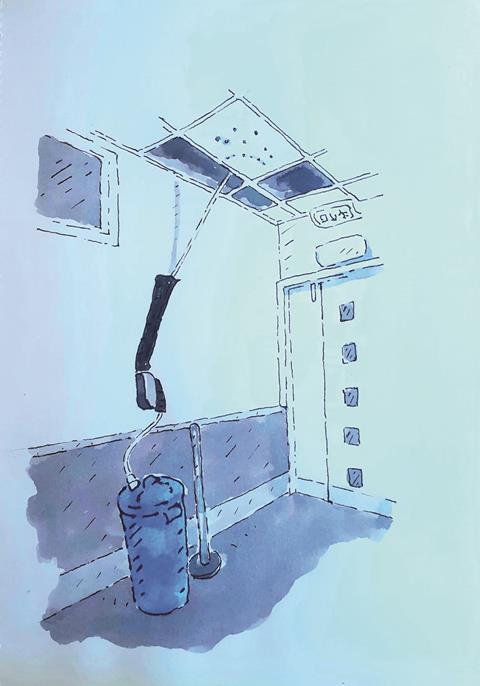Leaky roof, missing tiles, inadequate security...the Cardiff Civil and Family Justice Centre is not fit for purpose. The centre’s decrepitude touches raw nerves in Westminster’s relationship with Wales

‘It’s not so bad here – you want to see the state of Newport,’ a lawyer tells me as she rushes into a courtroom so small that both parties in a civil case can reach across and touch the judge’s desk.
Just a few feet away, an ugly blue bin collects water leaking from the roof of Cardiff Civil and Family Justice Centre. The building has at least three more of these bins dotted around – including outside the advocates’ room – and missing ceiling tiles are so common as to go unnoticed by most court users.
The state of this building, nestled almost literally in the shadows of the Principality Stadium and the shiny BBC Cymru building, has long been a source of discontent in the Welsh capital.
But new figures show just how expensive it is just to keep the justice centre functional, and senior judges are understood to be alarmed at the security implications of such a cramped and limited space.
Lawyers and judges look on with envy at relatively new civil justice centres in the likes of Bristol and Manchester, not to mention the 18-room court building being constructed in London’s Fleet Street. The feeling lingers that Cardiff – and other courts in Wales – fall between the cracks, where both Westminster and Cardiff authorities pass on responsibility for funding a purpose-built new court facility that will be worthy of a capital city.
A freedom of information request to the Ministry of Justice has revealed that the upkeep of the Cardiff justice centre is a constant drain on resources and a battle that is not being won.
'An ugly blue bin collects water leaking from the roof of Cardiff Civil and Family Justice Centre. The building has at least three more of these bins dotted around'

In the last three financial years, the MoJ has spent around £420,000 on repairs, with the largest outlay coming in 2022/23 when £188,000 was required to fix the lift at the four-storey site (local lawyers joke there was an opening ceremony held to mark the lift working again). A total of 89 works have been carried out.
But as of last month, 11 repair works remained outstanding. Faults on the air conditioning panels require ‘urgent investigation’; works need to be completed on the roof as tiles are missing and a drainpipe is faulty outside the building. Cleaning cupboards on two floors have no hot water and the water boiler is leaking in the judicial lounge. Extra cameras costing almost £6,000 are needed across the site – raising further concerns about security.
The state of the building is having a tangible impact on how the justice system functions. Since the start of 2023, five courtrooms have closed due to planned and unplanned works. In courts 14 and 15, which serve as family courts, the rooms were closed for one month and four months respectively for water leaks. Fire damage caused by an overheated CCTV monitor forced the closure of court nine for five months, as the floor, and electronic and air conditioning units were replaced. Water damage shut down courts one and two for almost five months last year.
Bizarrely, a periodic issue in court 14 going back several years has led to a temporary closure. The problem: flies. Multiple surveys have been conducted with pest control companies to attempt to locate the source and pest control foggings have been carried out. An electric fly trap has also been installed and carpets cleaned. Court users say none of this has worked, while the same court is also plagued by the semi-permanent smell of sewage.
These are just the faults that are reported. Visiting the court itself and speaking to lawyers and judges, a picture emerges of a building where problems are ignored and overlooked by court users and staff who are doing their best to work around them. As so often in our courts, the system relies on the goodwill of those using it.
The narrow corridors feel hot and stuffy – none of the public waiting areas has windows – and some rooms have a constant whirring sound that nobody seems to be able to identify, let alone fix. On my visit, a male and disabled toilet are out of order, as is a water dispenser.
'Sometimes I am the only barrier between a husband and wife in a dispute'
Family solicitor
Signs on meeting room doors stress that there are a limited number of consultation spaces and high demand for those that are available. Lawyers who use the court say they are sometimes forced to decamp to a café for client meetings.
Technology is a constant bugbear. In one of the family hearings I attend, a party’s solicitor has been unable to file a document electronically because it came to more than 50 pages. Just two courtrooms can accept video evidence.
'The walls are so thin that you can hear what is being said two rooms down. Imagine telling your client during a private consultation that they have to whisper?'
A solicitor
‘Sometimes I am the only barrier between a husband and wife in a dispute,’ a family solicitor tells the Gazette. ‘There are no waiting areas and people are waiting in the same open space.’
Another solicitor reports: ‘The walls are so thin that you can hear what is being said two rooms down. Imagine telling your client during a private consultation that they have to whisper? Another problem is that it’s not remotely clear where the building is as there’s no signposting. I tell them it’s tucked away next to the BrewDog pub. There have been instances where you are taking a vulnerable client through the back door to the court but there are no court staff to meet you.
‘There is just not enough room for everybody. There are not even enough chairs – you might find a meeting room free but the chairs have been moved.’
One solicitor who has practised in England as well as Cardiff says there may be a feeling that this type of working environment is routine.
‘My experience at first was this is what it must be like – but you go to Bristol or Swindon and it is completely different. People here in Cardiff need to realise what the disparity is. Practitioners assume it is like this everywhere.’
Judges are reluctant to speak out publicly for fear of appearing to be involved in political discussions. But there is alarm at the very highest levels of the judiciary that this situation is unsustainable and that the building is not fit for purpose.
It is understood that representations have been made to lady chief justice Baroness Carr; she spoke in general this week about security concerns in our courts and also lamented the state of Cardiff.
'You would think a capital city would have a civil justice centre which reflects Wales as a nation with increasingly devolved legislation. It is really a disgrace.'
Mick Antoniw MS, former counsel general

Judges believe there is a very real threat from potentially violent litigants who are in close proximity to the bench. Some district judges do not have a clerk with them and security guards are stationed only on the ground and second floors. In one court, the only escape route is a toilet that the judge has to lock themselves into. Safety concerns might once have been theoretical, but the brutal attack two years ago on a family court judge in Milton Keynes has put everyone on edge. Not only could it happen here, but there would be precious little to stop it.
Underfunding in the justice system is hardly confined to Cardiff or even Wales. Many reading this will have their own horror stories from courts local to them. But there is a sense in Cardiff that the city is being forgotten about because of the no man’s land it seems to find itself in, with justice partly devolved but the Wales government having no say – let alone the funds – to fix the issue. Put simply, Westminster assumes it is Cardiff’s problem, but Cardiff has to rely on Westminster to deal with it. The result is that investment in the court stalls, while lawyers and judges look out the window at the two-year-old state-of-the-art HM Revenue & Customs building.
‘They’ll spend money on collecting taxes, but we’re seen as a drain on taxes,’ quips one court user.
Mick Antoniw, a member of the Senedd and former counsel general for Wales, has long campaigned for a new justice centre befitting the size and importance of the region.
‘You would think a capital city would have a civil justice centre which reflects Wales as a nation with increasingly devolved legislation,’ he tells the Gazette. ‘It is really a disgrace and is hardly something the UK government is not aware of.
‘It is really holding back the development of parts of the legal economy in Wales. If you are going to pick a court to carry out commercial litigation, some of which is international, would you do it in Cardiff with a civil justice centre which is clearly on its downer? It is being allowed by the UK government to basically be ignored.’
Everyone we spoke to praised the security and court staff for doing such an admirable job in trying circumstances. And there is clearly a camaraderie and bond among the lawyers using the Cardiff court, who insist it is still an enjoyable place to work and are wary of talking it down. But the sense prevails that HMCTS can no longer keep papering over the literal cracks - even if they put a bucket underneath to catch any leaks.
The MoJ says spending is prioritised to ensure that buildings are safe, secure, meet statutory requirements and protect continuity of service. The department has a planned pipeline of future works to improve the resilience and quality of the court estate and this is kept under regular review to make sure it meets operational priorities. Work continues with local judiciary and court staff to identify and address areas with the highest maintenance priority.
A spokesperson added: ‘This government inherited a criminal justice system in crisis but is working at pace to ensure our courts infrastructure is safe and secure. This includes making improvements and maintenance at Cardiff Civil and Family Justice Centre – such as refurbishing lifts and replacing the roof over two courtrooms.’
This article is now closed for comment.




































4 Readers' comments